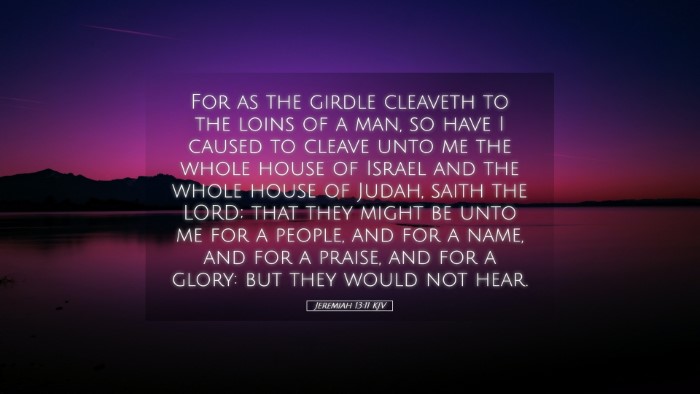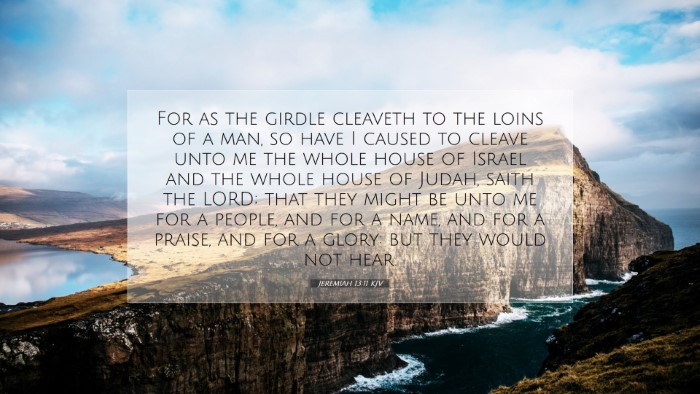Jeremiah 13:11 - Commentary and Insights
Bible Verse: "For as the girdle cleaveth to the loins of a man, so have I caused to cleave unto me the whole house of Israel and the whole house of Judah, saith the LORD; that they might be unto me for a people, and for a name, and for a praise, and for a glory: but they would not hear."
Introduction
The book of Jeremiah offers profound insights into the nature of God's relationship with His people, Israel and Judah. Jeremiah 13:11 stands out as a rich metaphor emphasizing God's desire for a close and enduring bond with His people, akin to that of a girdle or belt around a waist. This commentary synthesizes thoughts from notable public domain scholars to deepen the understanding of this verse for pastors, students, theologians, and Bible scholars.
Contextual Background
Jeremiah, known as the weeping prophet, spoke during a time of national crisis for Israel and Judah, facing imminent invasion and destruction due to their unfaithfulness. This verse is situated in a prophetic admonition about the consequences of disobedience.
Historical and Cultural Significance
In ancient Israel, a girdle was a significant garment, both practical and symbolic. It represented readiness, strength, and the binding relationship between a person and their duties. The imagery used in Jeremiah 13:11 relates to how God views His commitment to Israel while highlighting the people’s failure to reciprocate that commitment.
Verse Analysis
Metaphorical Significance
Matthew Henry emphasizes that as the girdle is tightly bound to a person, so is the Lord’s expectation for His people to maintain an intimate bond with Him. The girdle's purpose ensures that the garment is securely fastened, symbolizing how God sought to secure Israel in His covenant.
Albert Barnes points out that the girdle’s intimate connection to the loins represents the inner strength and support of a person. In this context, the call to such intimacy illustrates God's desire for Israel to embrace their role as His chosen people, bearing His name, praise, and glory.
Divine Purpose
According to Adam Clarke, God's intention was not just to establish a covenant but to cultivate a relationship that would reflect His glory through the lives of His people. The phrase "that they might be unto me for a people" underscores God’s initiative to have a people who would manifest His characteristics—holiness, justice, and righteousness—in their society.
Theological Implications
The implications of Jeremiah 13:11 are profound, raising important theological questions about human agency and divine sovereignty. Although God desires a committed relationship, the free will of Israel leads to their rejection of Him.
Human Rebellion
Both Henry and Barnes recognize that the response of Israel represents a broader human tendency to stray from divine intentions. “But they would not hear” poignantly encapsulates the tragic choice of the people to distance themselves from their Source of life. This notion presents a call for reflective evaluation of contemporary adherence to God’s voice amidst distractions.
Covenantal Relationship
The covenant relationship emphasized in this verse moves beyond mere obligation; it is a dynamic where God seeks mutuality with His creation. \strong>Matthew Henry notes that the Israelite's failure to adhere to God’s commands illustrates a broken covenant that necessitates restoration, a theme echoed throughout the prophetic literature.
Practical Application
Understanding Jeremiah 13:11 provides vital lessons for today’s church and individual believers. It serves as a reminder of God’s enduring desire for relationship, reflecting on how closely believers are intertwined with Christ, who fulfills all righteousness and covenant promises.
Maintaining Spiritual Intimacy
Just as a girdle is essential for holding garments together, believers are called to ensure spiritual disciplines (prayer, study, worship) maintain their closeness to God. Clarke suggests practical steps for cultivating a vibrant faith life that actively seeks God's presence and listens attentively to His guiding voice.
Corporate Responsibility
The verse highlights not only individual responsibility but also corporate identity among God’s people. Churches must reflect on their call to be "for a name, and for a praise, and for a glory" through righteous living and missional outreach, living testimonies of God's grace in a broken world.
Conclusion
In concluding reflections, Jeremiah 13:11 encapsulates the heart of God’s yearning for a devoted relationship with His people. It evokes a robust examination of loyalty, faithfulness, and the covenant realities that bind God and humanity. For pastors, theologians, and students, this verse is a reminder of both the privilege and responsibility that comes with being called by God, encouraging a response towards greater alignment with His will.


